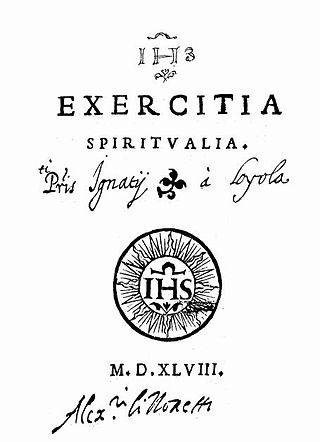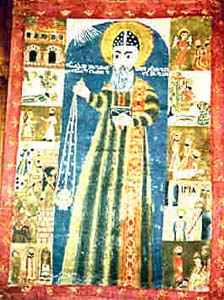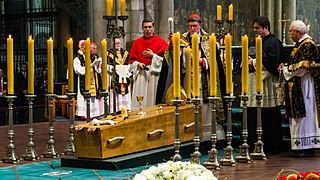
The epiclesis refers to the invocation of one or several gods. In ancient Greek religion, the epiclesis was the epithet used as the surname given to a deity in religious contexts. The term was borrowed into the Christian tradition, where it designates the part of the Anaphora by which the priest invokes the Holy Spirit upon the Eucharistic bread and wine in some Christian churches. In most Eastern Christian traditions, the Epiclesis comes after the Anamnesis ; in the Western Rite it usually precedes. In the historic practice of the Western Christian Churches, the consecration is effected at the Words of Institution though during the rise of the Liturgical Movement, many denominations introduced an explicit epiclesis in their liturgies.

Daniel Laurent Schutte is an American composer of Catholic and contemporary Christian liturgical music, best known for composing the hymn "Here I Am, Lord" and approximately 171 other hymns and Mass settings.

"Gloria in excelsis Deo" is a Christian hymn known also as the Greater Doxology and the Angelic Hymn/Hymn of the Angels. The name is often abbreviated to Gloria in Excelsis or simply Gloria.

Consecration is the transfer of a person or a thing to the sacred sphere for a special purpose or service. The word consecration literally means "association with the sacred". Persons, places, or things can be consecrated, and the term is used in various ways by different groups. The origin of the word comes from the Latin stem consecrat, which means dedicated, devoted, and sacred. A synonym for consecration is sanctification; its antonym is desecration.

Absolution is a theological term for the forgiveness imparted by ordained Christian priests and experienced by Christian penitents. It is a universal feature of the historic churches of Christendom, although the theology and the practice of absolution vary between Christian denominations.

Pedro Arrupe Gondra, was a Spanish Catholic priest who served as the 28th superior general of the Society of Jesus from 1965 to 1983. He has been called a second founder of the Society, which he led in the implementation of the Second Vatican Council, especially with regard to faith that does justice and preferential option for the poor.

The Spiritual Exercises, composed 1522–1524, are a set of Christian meditations, contemplations, and prayers written by Ignatius of Loyola, a 16th-century Spanish Catholic priest, theologian, and founder of the Society of Jesus (Jesuits).

The Confiteor is one of the prayers that can be said during the Penitential Act at the beginning of Mass of the Roman Rite in the Catholic Church. It is also said in the Lutheran Church at the beginning of the Divine Service, and by some Anglo-Catholic Anglicans before Mass.

A Christian child's prayer is Christian prayer recited primarily by children that is typically short, rhyming, or has a memorable tune. It is usually said before bedtime, to give thanks for a meal, or as a nursery rhyme. Many of these prayers are either quotes from the Bible, or set traditional texts.

"The Prayer of Saint Ephrem", is a prayer attributed to Saint Ephrem the Syrian and used during the Great Lent by the Eastern Orthodox and Byzantine Catholic Churches. In the Byzantine tradition, this prayer is considered to be the most succinct summation of the spirit of Great Lent and is hence the Lenten prayer par excellence, prayed during all Lenten weekday services. There are two versions of the prayer currently in use, reflecting liturgical Greek and Slavonic uses. Modern translations have been produced from both Greek and Slavonic, but some attempt to combine the two.

Examination of conscience is a review of one's past thoughts, words, actions, and omissions for the purpose of ascertaining their conformity with, or deviation from, the moral law. Among Christians, this is generally a private review; secular intellectuals have, on occasion, published autocritiques for public consumption. In the Catholic Church, penitents who wish to receive the sacrament of penance are encouraged to examine their conscience using the Ten Commandments as a guide, or the Beatitudes, or the virtues and vices. A similar doctrine is taught in Lutheran churches, where penitents who wish to receive Holy Absolution are also asked to use the Ten Commandments as a guide. The process is very similar to the Islamic practice of Muhasaba, or self-reflection.
Catholic spirituality includes the various ways in which Catholics live out their Baptismal promise through prayer and action. The primary prayer of all Catholics is the Eucharistic liturgy in which they celebrate and share their faith together, in accord with Jesus' instruction: "Do this in memory of me." The Catholic bishops at the Second Vatican Council decreed that "devotions should be so drawn up that they harmonize with the liturgical seasons, accord with the sacred liturgy, are in some fashion derived from it, and lead the people to it, since, in fact, the liturgy by its very nature far surpasses any of them." In accord with this, many additional forms of prayer have developed over the centuries as means of animating one's personal Christian life, at times in gatherings with others. Each of the religious orders and congregations of the Catholic church, as well as lay groupings, has specifics to its own spirituality – its way of approaching God in prayer to foster its way of living out the Gospel.

In Catholicism, the morning offering is a prayer said by an individual at the start of the day in order to consecrate oneself to Jesus Christ. The practice has traditionally been associated with the Apostleship of Prayer. While since 1929 the Pope has added a general and a mission intention to the traditional morning offering prayer each month, Pope Francis has restored this to the original, single monthly intention. Over time other forms of the morning offering prayer have been suggested.
The Collect for Purity is the name traditionally given to the collect prayed near the beginning of the Eucharist in most Anglican rites. Its oldest known sources are Continental, where it appears in Latin in the 10th century Sacramentarium Fuldense Saeculi X.

Thanksgiving after Communion is a spiritual practice among Christians who believe in the Real Presence of Jesus Christ in the Communion bread, maintaining themselves in prayer for some time to thank God and especially listening in their hearts for guidance from their Divine guest. This practice was and is highly recommended by saints, theologians, and Doctors of the Church.
Orate fratres is the incipit of a request for prayer that the priest celebrating Mass of the Roman Rite addresses to the faithful participating in it before saying the Prayer over the Offerings, formerly called the Secret. It thus corresponds to the Oremus said before the Collect and the Postcommunion, and is an expansion of those shorter exhortations. It has gone through several alterations since the Middle Ages.

Absolution of the dead is a prayer for or a declaration of absolution of a dead person's sins that takes place at the person's religious funeral.

Spiritual communion is a Christian practice of desiring union with Jesus Christ in the Eucharist. It is used as a preparation for Mass and by individuals who cannot receive Holy Communion.
Ignatian spirituality, similar in most aspects to, but distinct from Jesuit spirituality, is a Catholic spirituality founded on the experiences of the 16th-century Spanish Saint Ignatius of Loyola, founder of the Jesuit order. The main idea of this form of spirituality comes from Ignatius's Spiritual Exercises, the aim of which is to help one "conquer oneself and to regulate one's life in such a way that no decision is made under the influence of any inordinate attachment." The Exercises are intended to give the person undertaking them a greater degree of freedom from his or her own likes and dislikes, so that their choices are based solely on what they discern God's will is for them. Even in the composition of the exercises by Ignatius early in his career, one might find the apostolic thrust of his spirituality in his contemplation on "The Call of the Earthly King" and in his final contemplation with its focus on finding God in all things.

The episcopal or pontifical blessing is a blessing imparted by a bishop, especially if using a formula given in official liturgical books.














